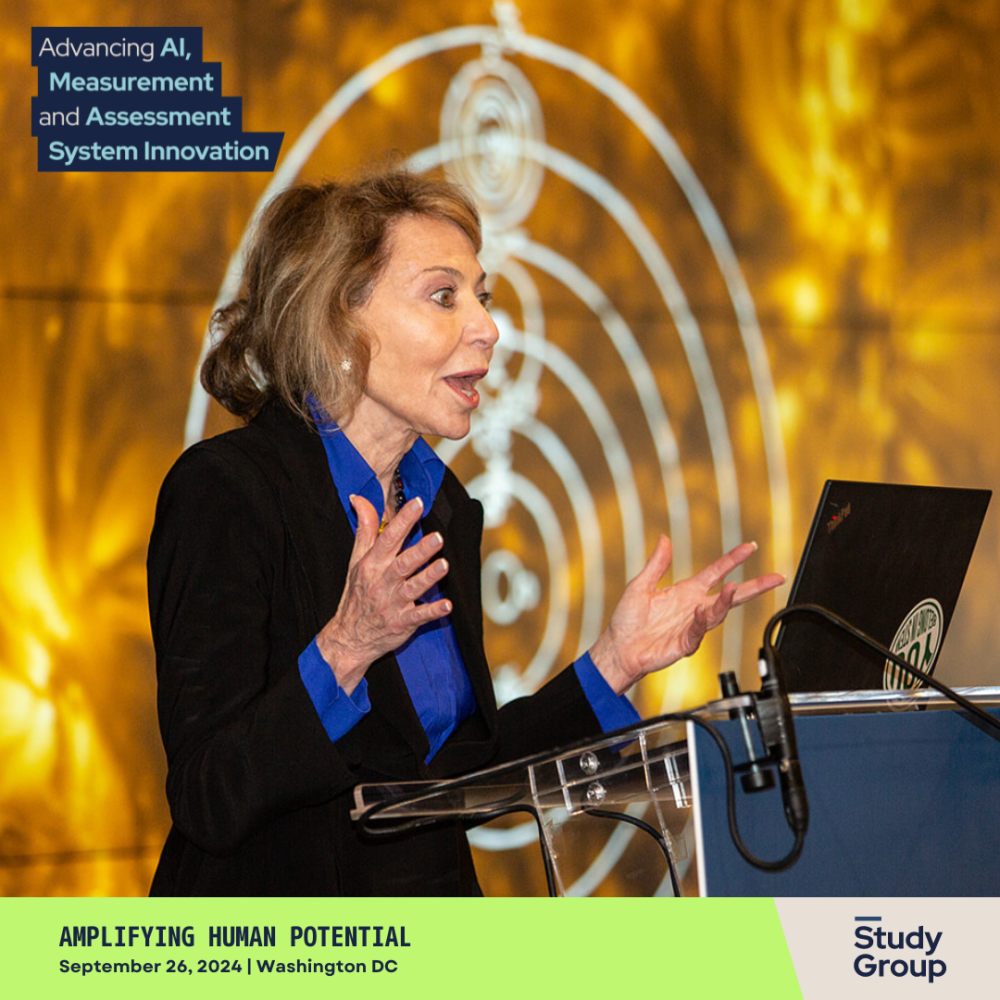Pamela Cantor, M.D.’s Call to Action: Measuring What Truly Matters for Learning and Development
In a post originally published on his blog, Eric Tucker reflects on Dr. Cantor's keynote at the Advancing Artificial Intelligence, Measurement and Assessment System Innovation Summit.
September 30, 2024
By Eric Tucker
On September 26, 2024, leaders from across the country gathered at the Advancing Artificial Intelligence, Measurement and Assessment System Innovation Summit at the Planet Word Museum in Washington, DC. In collaboration with the National Science Foundation and Institute for Education Sciences, The Study Group hosted senior leaders from 40 philanthropic foundations and 15 federal agencies; the summit brought together senior leaders from the Biden-Harris Administration, state chiefs, civil rights advocates, and innovators in science and education. It was against this backdrop that Pamela Cantor, M.D., delivered a powerful keynote that challenged the audience to rethink how we measure and support human potential. Dr. Cantor argued that our traditional methods—much like outdated scientific theories—fail to capture the dynamic nature of human learning and development. Instead, she made a compelling case for new approaches that recognize the critical role of context in shaping performance, urging us to build systems that unlock, rather than constrain, what each individual is truly capable of achieving.
From Medicine to Human Potential: A Trailblazer’s Journey

Pamela Cantor, M.D., is a child and adolescent psychiatrist known for her pioneering work in the science of learning and human development. As the Founder and CEO of The Human Potential L.A.B., she leverages scientific knowledge and technology to transform learning and workforce ecosystems to unlock the potential in every individual. Her unique perspective is grounded in her experience treating children impacted by trauma, which led her to found Turnaround for Children, an organization now known as the Center for Whole-Child Education at ASU. Dr. Cantor’s career spans roles in medicine, research, and education, making her a trusted leader in reimagining how we understand the science of human development. She brings this blend of expertise and empathy to her presentations, challenging audiences to rethink traditional views of learning, growth, and talent.
Challenging Outdated Myths: Genes, Context, and the Power of Possibility
One of Dr. Cantor’s core arguments is that deeply ingrained myths about human potential, like the belief that genes dictate who we become, are fundamentally flawed. Drawing on advances in neuroscience and developmental science, Dr. Cantor argues that genes are not static blueprints but dynamic elements that respond to context—the relationships, environments, and experiences that shape our development over time. She calls this the “dimmer switch” effect, where genes are turned on or off depending on the conditions surrounding us. This means that talent, intelligence, and even resilience are not fixed traits but highly malleable, and they emerge in different ways depending on the support and opportunities each person receives. According to Dr. Cantor, the outdated bell curve model of human capability, which assumes a narrow distribution of talent, is dangerously incomplete. Instead, she emphasizes that variation is the norm, not the exception, and human potential cannot be predicted in advance.
Rethinking Human Potential: Embracing Context to Unlock Learning and Development
Like scientific revolutions of the past, Dr. Cantor contends that we need a paradigm shift in understanding and measuring human learning and development. She draws on historical examples, including Nicolaus Copernicus and Alexander Fleming, to show that breakthrough changes happen when flawed theories lead to mistake after mistake, new instrumentation emerges, and a better theory emerges to explain what we observe. Today, Dr. Cantor believes we are at that juncture in education. Outdated theories about fixed intelligence and limited potential are being overturned by insights from neuroscience, paving the way for a new paradigm that redefines what human beings are capable of achieving. The key, she argues, is context: the environment, relationships, and experiences that shape how genes are expressed and skills are developed. To truly support growth, we need educational systems that account for the complex interplay between individuals and their surroundings, creating environments that reveal, rather than constrain, each person’s unique capabilities.
Visual Storytelling for Accessible Science Communication

Stepping back, it’s critical to appreciate how Pamela Cantor’s visually striking presentations combine high-quality images, succinct statements, and thoughtful graphics to make complex ideas accessible and engaging. Her clean, structured design prioritizes clarity and impact, using bold colors and visual metaphors to highlight key concepts and guide the audience through central themes of human growth, potential, and change. Each slide is carefully crafted to connect scientific insights with real-world applications, leaving a lasting impression that flows seamlessly from one idea to the next. This visual storytelling approach allows her to bridge the gap between rigorous research and practical strategies, making her arguments resonate with audiences from policymakers and educators to parents and caregivers.
Beyond Standardized Tests: A New Approach to Measurement
Dr. Cantor argues that our current systems of measuring human potential are fundamentally misaligned with how learning and development actually occur. Standardized tests, she contends, only capture a snapshot of an individual’s abilities at a single point in time, comparing them to a static norm. This approach fails to recognize the dynamic nature of human development and ignores the powerful role that context plays in shaping performance. Dr. Cantor calls for a new paradigm of measurement—one that considers not just individual skills but also the fit between a person and their environment. Just as Olympic athletes like Katie Ledecky and Gabby Thomas rely on environments meticulously designed to amplify their strengths, Dr. Cantor believes we need similarly nuanced educational approaches to reveal each learner’s potential.
Precision Learning: Using Context to Unlock Potential
Pamela Cantor, M.D. draws a compelling parallel between the future of education and the precision of targeted cancer therapies. At the Dana Farber Cancer Institute, she reports that researchers have found that by changing the context of a cancer cell within an individual patient, they can destroy that cell without damaging surrounding tissue. Dr. Cantor argues that emerging technologies like artificial intelligence (AI) could allow us to apply similar precision to education, tailoring learning environments to each student’s strengths and needs. The challenge, she emphasizes, is not whether everyone can become a Simone Biles or an Amanda Gorman, but whether we can build tools and systems that reveal the true developmental range of every individual. For Dr. Cantor, the future of education lies in creating environments that allow everyone to reach their fullest expression of potential.
Conclusion: A Call to Transform How We Measure in Service of Learning and Development
Pamela Cantor’s message is clear: to truly unlock human potential, we must move beyond outdated theories and standardized assessments and build systems that measure both the individual and the context in which they develop. Understanding human potential means understanding the dynamic relationship between a person and their environment, allowing us to see and cultivate strengths that might otherwise go unnoticed. By rethinking measurement in this way, we can create learning systems that reveal, rather than constrain, what each person is capable of achieving—ultimately transforming education and opening doors to new possibilities for learners everywhere.
*This article was originally published by Eric Tucker on his blog on LinkedIn and was republished here with permission.*



